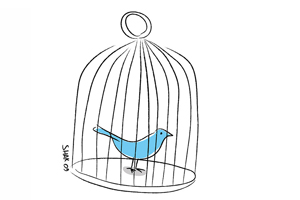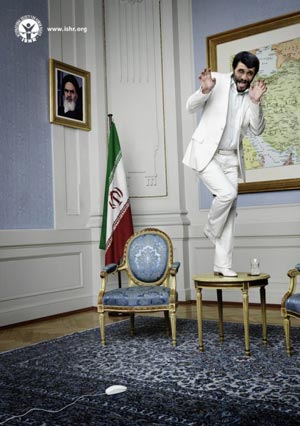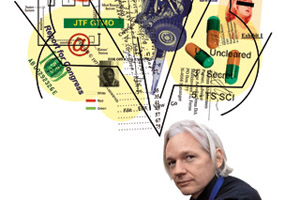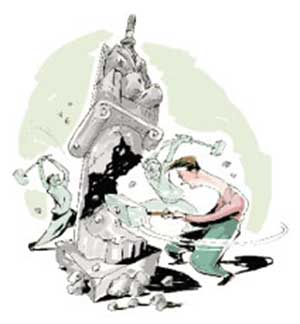
Illustration: <a href="http://www.flickr.com/photos/83325634@N00/4348979414/">Stelle Cadenti</a>
Read also: What’s happening in Tunisia explained, and the latest news on Egypt unrest.
In April 2009, Evgeny Morozov wrote a blog post about antigovernment protesters’ use of social networking tools in Moldova, wondering if the country was in the midst of a “Twitter revolution.” The demonstrations soon dropped from the headlines, but a meme was born: When Iranians took to the streets—and the tweets—a few months later, Western pundits and journalists declared a “Twitter revolution”; Andrew Sullivan announced, “The Revolution Will Be Twittered.” The phrase has since been applied to events from Guatemala to Uganda. Most recently, it’s been used to describe the protests in Tunisia that led to the flight of its autocratic president.
Yet Morozov has become intensely skeptical of the concept he helped introduce. The 26-year-old Foreign Policy blogger and visiting scholar at Stanford University’s Liberation Technology Program now rarely misses a chance to throw cold water on those who suggest we can tweet, friend, or text our way to a freer, more democratic world. In his new book, The Net Delusion: The Dark Side of Internet Freedom, he presents a wide-ranging assault on the notion that the internet is an inherently liberating force. Unlike fellow cyber-skeptic Malcom Gladwell, Morozov doesn’t completely dismiss online organizing. Rather, he advocates taking a less starry-eyed view of its potential: “The idea that the Internet favors the oppressed rather than the oppressor is marred by what I calll cyber-utopianism: a naïve belief in the emancipatory nature of online communication that rests on a stubborn refusal to admit its downside.” (For a good example of this mindset, consider this Tunisia-inspired letter to the New York Times: “Anyone subject to political repression anywhere can now be an influential ‘minister without portfolio,’ able to organize and call the people into the streets to demand reform.”)
One major downside of the internet revolution, according to Morozov, is that instead of fearing the internet, authoritarian regimes can learn to use it to their advantage: China has deployed a small army of users known as the 50-Cent Party to post pro-government comments on blogs and in chat rooms. The same sites and mobile apps favored by Iranian dissidents also have been used by the Ahmadinejad government to track them down. Venezuelan president Hugo Chavez has more than 1.1 million Twitter followers.
Morozov also argues that the internet’s attractiveness as an organizing tool and as an entertainment medium can undermine serious political action. Beyond the risks of slacktivism, there’s also the risk that the internet is breeding complacency by distracting the digital natives who might otherwise become cyber-activists. Morozov has seen this in his native Belarus, as well as in Russia, where young people enjoy “a very nice digital entertainment lifestyle.” That, he quips, “does not necessarily turn them into the next Che Guevara.”
Mother Jones: Andrew Sullivan and others have suggested the recent events in Tunisia were a “Twitter revolution.” Even if this is an exaggeration, what’s wrong with emphasizing the role of social media played as an organizing tool?
Evgeny Morozov: There are several kinds of consequences here. First, I think other dictators are likely to overreact to the threat of the internet and crack down on activists, bloggers, and internet users really heavily. So for all I care, I’d rather have them believe it was a Jasmine Revolution and ban the flower rather than to think it was a Twitter revolution and ban Twitter. Second, I think giving social media more credit than it deserves is likely to make many more people believe that whenever social media is present they can expect similar outcomes. This, of course, would be wrong, as the protests in Tunisia were driven by economic and political considerations (and internal politics, like the refusal of the army to intervene) than they were by the presence of social media. We can be relatively certain that if Ben Ali didn’t fall, his police would now be carefully studying all tweets and Facebook messages posted during the protest and arresting everyone involved.
MJ: Deposed Tunisian president Zine al-Abidine Ben Ali’s downfall has also been linked to WikiLeaks’ release of a US diplomatic cable discussing his “shady dealings” and corruption. You recently tweeted, “The very thought of having to debunk the myth of Tunisia’s ‘WikiLeaks Revolution’ already makes me sick.” At the risk of making you feel even sicker, will you elaborate on that?
EM: Well, if they called it a FourSquare revolution, I’d feel as sick thinking about this. As I’ve said above, the trouble with such labels is that they carry an implicit expectation that there is something about the internet—the way in which it gave cover to WikiLeaks after many powerful players in the US went after it—that invariably weakens authoritarian power. I think that this is narrative is wrong and the sooner we put it to rest, the better.
MJ: In The Net Delusion, you write critically about “cyber-utopians”—people who place too much faith in the power of the internet to spread democracy and human rights and even bring down governments. Is WikiLeaks’ Julian Assange a cyber-utopian?
EM: I think an older version of Assange definitely was. But I think he has matured quite a bit. I haven’t spoken to him, so I have no idea what’s gong on in his mind. But from the way that WikiLeaks has evolved, I think there has been a tremendous change. They now cooperate with the media proactively. The typical cyber-utopian would just put everything online and put out a press release out to and say, “Blog the hell out of this.” Instead, Assange is doing things very strategically, going after key media. He’s been smart. Judging by his actions, [he seems to think] that information by itself is not enough. He’s realizing that first he needs journalists to publicize and contextualize this. I think the next step for him would be to realize that he needs to start working with NGOs like Human Rights Watch and Amnesty to actually take action or campaign on some of the issues highlighted in the cables. I think that engineers and people who come from a technical background like Assange soon discover that often technology entrenches older problems without providing any viable solution.
MJ: In December, Russian President Dmitry Medvedev’s office said Assange deserves a Nobel Peace Prize. Meanwhile, the US government has voiced its support for Liu Xiaobo, the Chinese dissident who just won the Nobel. It seems like most governments are all for internet freedom so long as it’s in rival countries.
EM: I think that’s a fair summary. I just looked through the Russian news and saw a story about the Russian government basically harassing a whistleblower. That happened just 24 hours after someone from the Kremlin wanted to nominate Assange for the Nobel Peace Prize. The basic geopolitical interests will still always be there; they will not be canceled away. That’s why I’ve been so skeptical of “internet freedom” as a concept, since it’s just not responsive to the other demands of American foreign policy. It just sets up a trap for the US government because it will reveal their hypocrisy. For many people, this quest to promote internet freedom will join a long list hypocritical initiatives and buzz words which always sound Newspeak-like.
MJ: You’re referring to Hillary Clinton’s unveiling of what you call the “internet freedom agenda,” a speech in which she announced that the US is committed to spreading online freedom and the “freedom to connect.” In light of the government’s response to WikiLeaks, do you take this commitment to internet freedom seriously?
EM: I’m just not buying into the whole concept. It’s really heard to understand what they mean by “internet freedom.” I draw a distinction between freedom of the internet and freedom via the internet. In the first case, it’s making sure cyberspace is not over regulated and people can say what they want without fear of repercussions. But that’s different from this freedom via the internet notion, which is often touted by all sorts of conservatives and neoconservatives who want young people in the Middle East and elsewhere in the world to use Facebook and Twitter and then go oppose their governments. For them it’s just a means of extending the Bush freedom agenda and using cyberspace to overthrow governments they don’t like. You can not say, “We want to promote internet freedom,” when every single other branch of the US government wants to promote the opposite.
Throwing big words like this around ends up politicizing the internet because most governments will assume that what the US government means is promoting freedom via the internet. They will assume that the US wants to promote Twitter revolutions. And assuming that, most will react in a way that serves to restrict the internet.
 Ad for International Society for Human RightsMJ: The International Society for Human Rights just launched an ad campaign showing various autocrats cowering at the sight of a computer mouse. Visually, it’s brilliant, but is this idea that authoritarian governments automatically see the internet as a threat accurate?
Ad for International Society for Human RightsMJ: The International Society for Human Rights just launched an ad campaign showing various autocrats cowering at the sight of a computer mouse. Visually, it’s brilliant, but is this idea that authoritarian governments automatically see the internet as a threat accurate?
EM: Let me unpack this. It is true that authoritarian governments increasingly see the internet as a threat in part because they see the US government behind the internet. It would not be accurate to say they are reacting to the threat posed by the internet, they are reacting to the threat poised by United States via the internet. They are not reacting against blogs, or Facebook or Twitter per se, they are reacting against organizations like the National Endowment for Democracy funding bloggers and activists. This fits into long-running fears about color revolutions and regime change facilitated from abroad.
MJ: What do you mean when you argue that the internet can breed complacency—that it’s the new opiate of the masses?
EM: Many of us were a little to early to assume that the most logical uses of the internet in authoritarian states would be to empower people. And to force them towards participation in politics. If you look at most authoritarian states, they are very grim places to live in—I come from one. It’s not the most exciting place to live in and the politics of it makes it even worse! The only good thing about it is fast internet. That’s the only way you can find some meaning in an otherwise very dark and gloomy life. If you look at Russia, there is no internet censorship. They banned a handful of websites, but it’s nowhere on the level of China. They use the internet as an entertainment platform, more or less. Russian young people spend countless hours online downloading videos and having a very nice digital entertainment lifestyle, which does not necessarily turn them into the next Che Guevara.
MJ: In your book, you tell this remarkable story about East Germany and the impact of Western media there. Do you mind repeating it?
EM: If you look at East Germany, it was in a unique position. Pretty much he entire country with the exception of a very small piece of territory could receive broadcasts from the West. So you ended up with a significant chunk of East Germans watching only western TV. The assumption that some of us would make, if we really believe that information empowers, would be that East Germans would be watching news from West Germany in order to know what’s really happening. But it turns out what was happening was that East Germans were actually turning to western television only to watch soap operas. They would watch Miami Vice or Dynasty; the news from West Germany was the least popular type of programming. What’s most interesting is that later there was some research done looking at the attitudes of East Germans toward the West German state and how many wanted to leave the country. And they basically found out that those who could not receive West German television were the least satisfied with life and the most likely to apply for exit visas.
That experience slightly confirms the thesis that the internet can be the opiate of the people. With the internet we are facing more or less a very similar story. It does offer virtually limitless access to entertainment and for many people living in extremely depressing conditions in authoritarian states, it does provide a vehicle for getting by. For many oppositional movements, the internet, while providing the opportunity to distribute information more quickly and cheaper, may have actually made their struggle more difficult in the long run.
MJ: You’re currently in Belarus. Is the fact that we’re having this conversation via Skype mean that Belarus has relative online freedom or just that the Belarusian government isn’t very good at monitoring the internet?
EM: Here it’s not really as bad as it is in Iran or China. There is still very little internet censorship. I’m at my parents’ house; if I were in an internet café, it would be worse because I would have to present my passport. But to tell you the truth, you have to present a passport when you visit an internet café in Rome. You’ll probably have to do that [in the United States] at some point if the next Times Square bomber detonates his bomb from an internet café.















